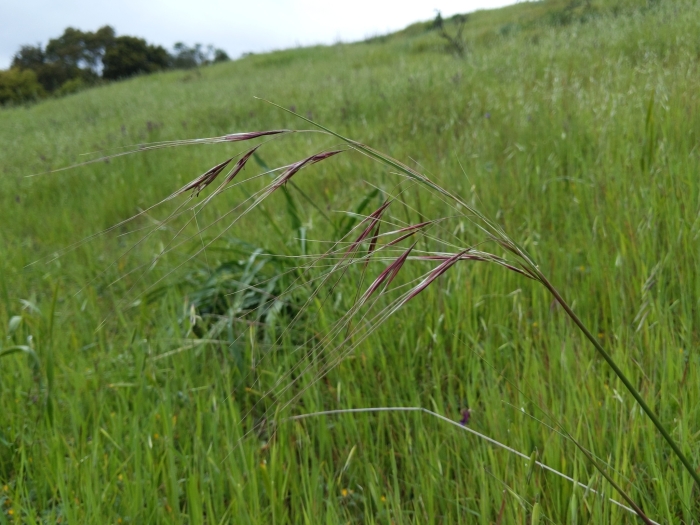Purple Needlegrass
(Nassella pulchra)
Purple Needlegrass (Nassella pulchra)
/
/

Ken-ichi Ueda
CC BY 4.0
Image By:
Ken-ichi Ueda
Recorded By:
Copyright:
CC BY 4.0
Copyright Notice:
Photo by: Ken-ichi Ueda | License Type: CC BY 4.0 | License URL: http://creativecommons.org/licenses/by/4.0/ | Rights Holder: Ken-ichi Ueda | Publisher: iNaturalist | Date Created: 2020-03-28T22:45:24Z |




















































Estimated Native Range
Summary
Nassella pulchra, commonly known as Purple Needlegrass, is a deciduous perennial grass that is native to the grasslands and open areas within forests, as well as chaparral and coastal sage scrub ecosystems in California and Northwestern Mexico. It can grow up to 1 meter (3.3 ft) tall, forming dense tufts of erect, unbranched stems. The extensive root system, which can reach depths of 20 feet (6.1 m), enhances its drought tolerance, making it a resilient species in its native dry environments. The inflorescence is open and nodding, extending up to 60 centimeters with numerous branches that bear spikelets. When young, the pointed fruit exhibits a purple tinge and features an awn that can be up to 10 centimeters long, twisted and bent twice, aiding in seed dispersal and self-burial.
Purple Needlegrass is valued for its adaptability to dry conditions and its ability to produce a large amount of seed, up to 227 pounds per acre in dense stands, which can be beneficial for soil stabilization and habitat restoration projects. It is often used in native plant gardens, restoration sites, and as an ornamental grass in xeriscaping due to its low water requirements. In cultivation, it thrives in full sun and can tolerate a range of soil drainage conditions, from fast to slow. While it is generally low-maintenance, care should be taken to manage its spread in garden settings to prevent it from becoming too dominant.CC BY-SA 4.0
Purple Needlegrass is valued for its adaptability to dry conditions and its ability to produce a large amount of seed, up to 227 pounds per acre in dense stands, which can be beneficial for soil stabilization and habitat restoration projects. It is often used in native plant gardens, restoration sites, and as an ornamental grass in xeriscaping due to its low water requirements. In cultivation, it thrives in full sun and can tolerate a range of soil drainage conditions, from fast to slow. While it is generally low-maintenance, care should be taken to manage its spread in garden settings to prevent it from becoming too dominant.CC BY-SA 4.0
Plant Description
- Plant Type: Grass
- Height: 1-2 feet
- Width: 2-3 feet
- Growth Rate: Rapid
- Flower Color: N/A
- Flowering Season: Spring
- Leaf Retention: Deciduous
Growth Requirements
- Sun: Full Sun
- Water: Low
- Drainage: Fast, Medium, Slow
Common Uses
Butterfly Garden, Deer Resistant, Drought Tolerant, Erosion Control, Fire Resistant, Low Maintenance
Natural Habitat
Native to grasslands and open areas within forests, as well as chaparral and coastal sage scrub ecosystems in California and Northwestern Mexico
Other Names
Common Names: Flechilha, Purple Tussockgrass
Scientific Names: , Stipa pulchra, Nassella pulchra,
GBIF Accepted Name: Nassella pulchra (Hitchc.) Barkworth